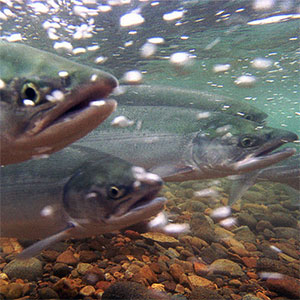
Republican Senators Call on Lt. Gov. Mallot to Fight "Ballot Box Biology"By MARY KAUFFMAN
October 14, 2017
The Superior Court for the State of Alaska ruled on October 9th, in favor of "Stand for Salmon" and approved the printing of petition books for the Stand for Salmon Ballot Initiative, a measure that proposes updates to Alaska’s 60-year-old law governing development in salmon habitat. According to "Stand for Salmon", the proposed updates would bring certainty and stability to the permitting process and promote responsible resource development in a growing and changing Alaska. The application was submitted by three Alaskans with deep ties to the state’s fisheries – Mike Wood, Brian Kraft and Gayla Hoseth. Superior Court Judge Mark Rindner ruled the controversial "Stand for Salmon" ballot initiative to be constitutional, overturning the contrary decision by Lt. Gov. Byron Mallott less than a month earlier. "What this means is that the initiative will get certified and Stand for Salmon can start collecting the signatures it needs to get the initiative on the ballot,” said Valerie Brown, legal director for Trustees for Alaska and the attorney who argued the case for the plaintiff, Stand for Salmon. “We stand behind the lieutenant governor’s original rejection of an initiative that proposes ballot box allocation,” Sen. Cathy Giessel (R-Anchorage), chair of the Senate Resources Committee. “A careful evaluation by state attorneys made it clear that this initiative is unconstitutional. The Supreme Court needs to hear the facts.” Initiative 17FSH2, also known as the "Stand for Salmon Initiative", applied to gather signatures and appear on the ballot of next year’s election. After a thorough review process, the lieutenant governor denied certification on September 12th. The initiative’s sponsors appealed in court, and an initial ruling by an Anchorage judge contradicted the lieutenant governor’s decision. “Alaska’s constitution wisely leaves resource management to professional biologists, not the ballot box,” said Sen. Peter Micciche (R-Soldotna), Majority Leader of the Alaska Senate. “Allocating access through bumper sticker campaigns endangers every Alaskan’s right to work and right to fish. Just as the Cook Inlet setnet initiative was ruled unconstitutional, I encourage the Walker administration to appeal this decision immediately.” The state has not yet decided to appeal the case. “Like many Alaskans, salmon is my livelihood and the food on my table,” said Sen. Micciche. “I call upon all legislators to work together in understanding a proper balance between healthy fish habitat and responsible resource development.” “We live in an owner state and Alaskans have the right to have their voices heard. This ballot measure is an important step back to the levels of protection for salmon that were intended by the authors of the Alaska constitution. These are needed updates to an outdated law that will balance responsible development with protecting Alaska’s wild salmon, one of the state’s most vital natural resources from a cultural, economic and recreational perspective,” said Gayla Hoseth, one of the initiative sponsors, from Dillingham. Trustees for Alaska filed the lawsuit after Lt. Gov. Byron Mallott rejected the ballot measure in September. The state argued that the initiative would effectively remove the legislature’s discretion over allocations. It argued, in essence, that Alaska citizens cannot put a thumb on the scale of how state assets - in this case water - are used. Trustees for Alaska argued that though the initiative sets guidelines, it provides appropriate discretion to the Alaska Department of Fish and Game for determining what the specifics of protections and mitigation should look like. It will not stop all big projects as the state claimed in court, said Brown, legal director for Trustees for Alaska and the attorney who argued the case for the plaintiff, "Stand for Salmon", but it would lead to increased scrutiny on projects that can do a lot of harm. In addition to giving people a voice in the protection of salmon habitat, Trustees for Alaska said this case is also important in clarifying that the power of the initiative, the people’s right to make law directly. “The Lt. Governor’s denial of certification was too broad and would have restricted the right to initiative if Stand for Salmon had not successfully challenged it,” said Brown.
On the Web:
Related News:
Source of News:
Representations of fact and opinions in comments posted are solely those of the individual posters and do not represent the opinions of Sitnews.
|
|||
